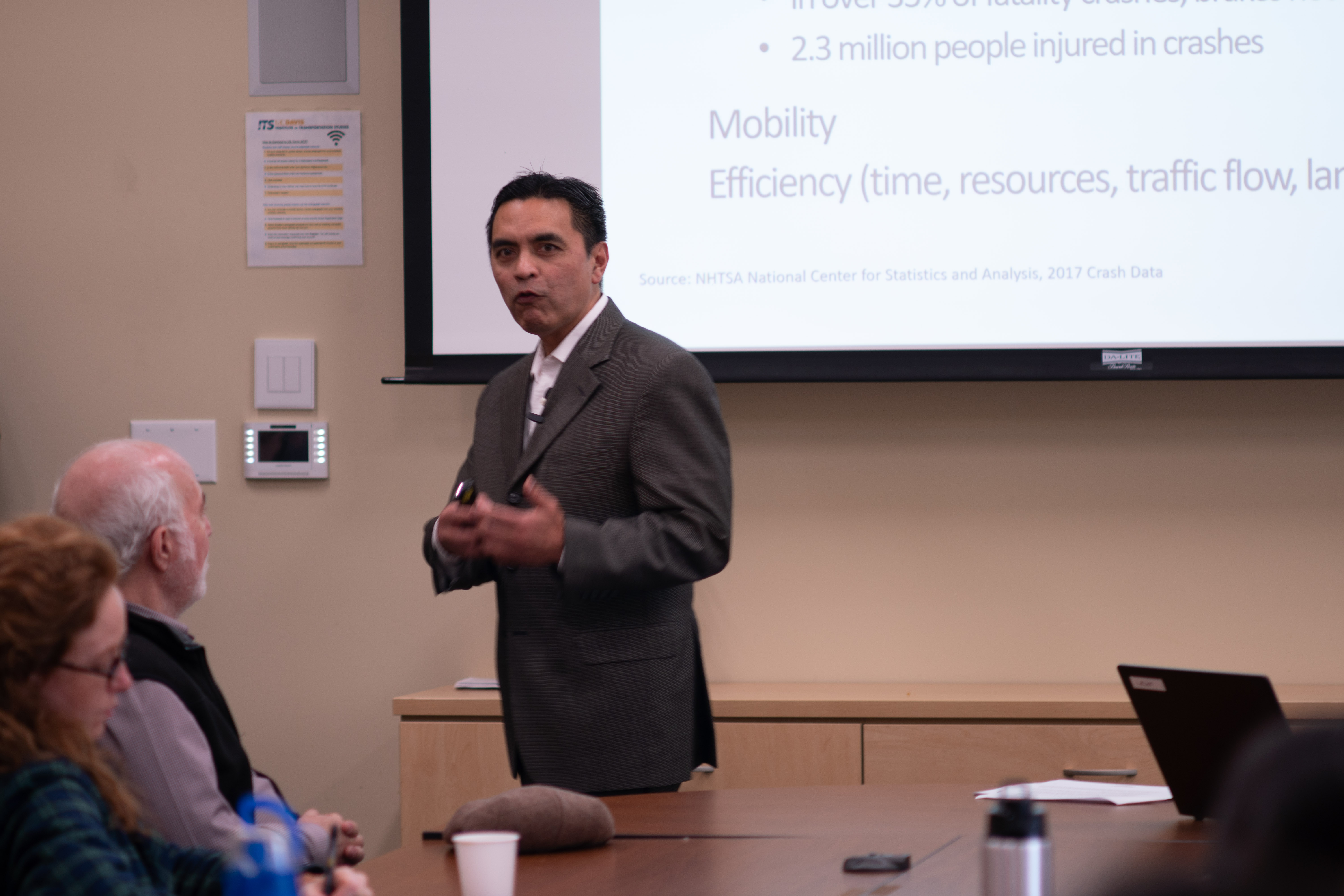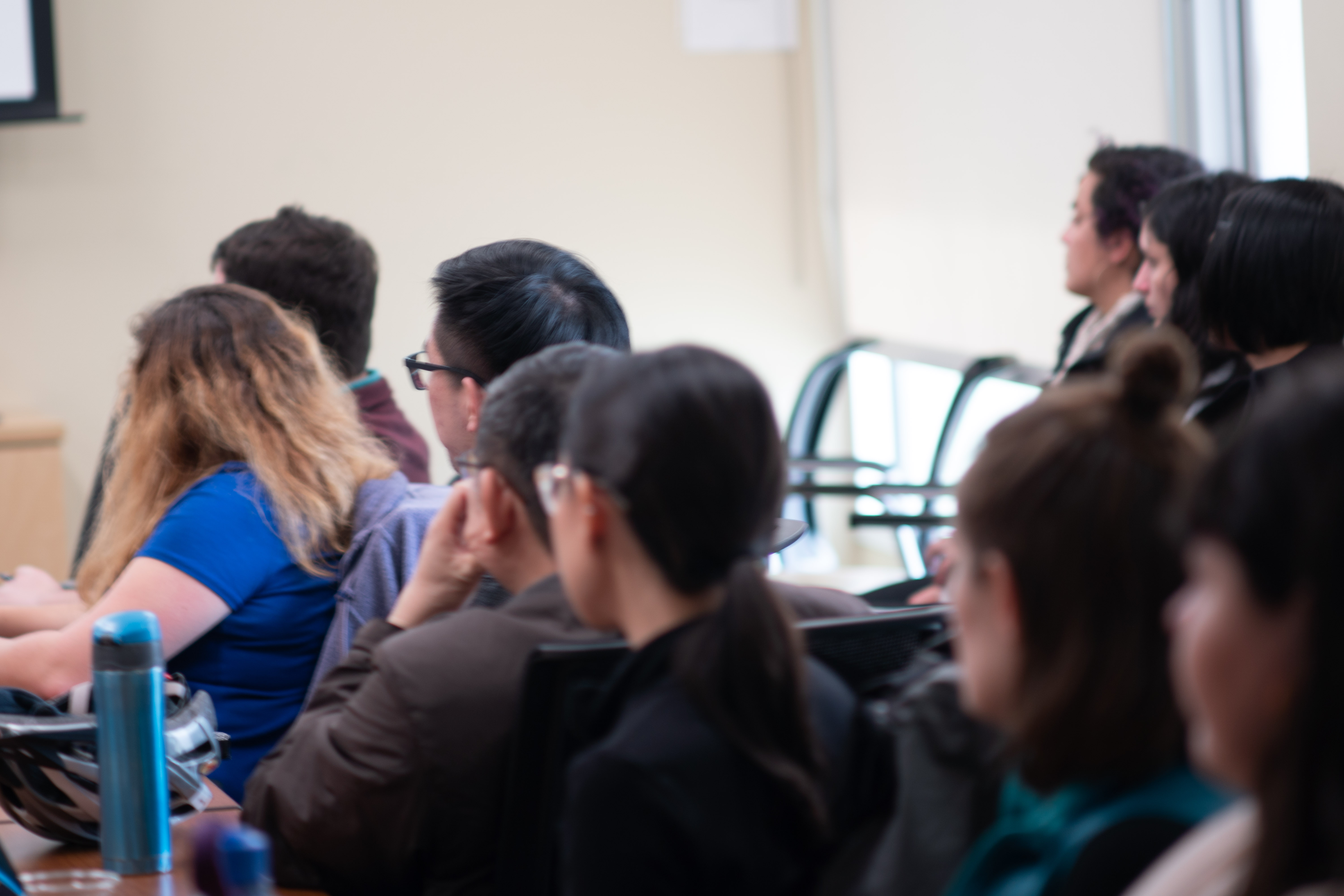News | California Department of Motor Vehicles--Bernard Soriano Shares Insights on Self- driving Vehicle Development, Regulation, and Testing
Stop the VideoNews

METRANS UTC
California Department of Motor Vehicles--Bernard Soriano Shares Insights on Self- driving Vehicle Development, Regulation, and Testing
Monday, February 25, 2019
by By Seth Karten
With self-driving vehicles capturing the attention of the public, industry, investors, government, and the media, the head of the autonomous vehicle program at the California Department of Motor Vehicles (DMV) was the featured speaker at the February 1 seminar hosted by the Institute of Transportation Studies at UC Davis (ITS-Davis).
DMV Deputy Director Bernard Soriano spoke at the seminar, sponsored through ITS-Davis’ partnership with the Pacific Southwest Region University Transportation Center.

Entitled, “Autonomous Vehicles in California,” the seminar covered a broad range of topics, including evolving regulations and publicly available information on vehicle testing.
As an introduction, Soriano highlighted major benefits likely to come from autonomous vehicles: a reduction in motor vehicle fatalities and increased mobility for people unable to drive. He pointed out that in 2017 in the U.S., 37,223 people were killed in motor vehicle accidents, and 90% of these deaths were due to human decisions.
He then summarized the DMV records on automated vehicle testing. These records show that companies are investing a great deal in this field: 66 U.S. and international companies have permits to test automated vehicles in California, and 700 vehicles have been tested since 2014?about half of these by Google-Waymo and GM-Cruise. Regarding accidents, there have been 132 since 2014, almost all were minor and involved an automated vehicle being hit from behind by a conventional vehicle. This highlights an area that will have to be addressed?where there is incongruity between automated vehicle programs and human driving behavior.
Soriano explained how the first California regulations for automated vehicles, released in September 2014, required a trained test driver to be in each vehicle and the reporting of all instances when the driver took control, or ‘disengaged,’ the automated system. In 2017, there were about 2000 of these disengagements in about 500,000 miles of test drives. The updated state regulations, released in April 2018, allow vehicles to be operated without a test driver present, but they must have remote monitoring and control, and the manufacturer must notify local authorities about the testing beforehand.
The seminar also covered how manufacturers themselves are required to certify the safety of the equipment in these vehicles, in accordance with federal regulations from the National Highway Traffic Safety Administration. The responsibility of the DMV, on the other hand, is to regulate how the vehicles are operated. There was debate among the DMV and stakeholders over the decision not to require a third party to certify the safety of onboard equipment.

Another important issue raised in the seminar was the potential for job losses for millions of drivers in the U.S. as automated vehicles become more common. Soriano recounted how the Teamsters labor union had initiated conversations with the DMV to express their concerns. He emphasized that the DMV and others will need to consider the effects of these vehicles on employment.
Bernard Soriano is a deputy director for the California Department of Motor Vehicles and oversees California’s autonomous vehicles program. He has over 35 years of engineering and management experience in the private and public sector?and previously held engineering and management positions at Hughes Space and Communications, Inc. (now Boeing), where he designed spacecraft altitude control systems and was involved in their launch missions. He was a lieutenant in the U.S. Navy Reserve and a finalist in the NASA astronaut candidate program. He holds a Ph.D. in engineering from UC Irvine, an M.S. in mechanical engineering from the University of Southern California, a B.S. in mechanical and aeronautical engineering from UC Davis, and an MBA from California State University, Sacramento.
You can view a full recording of Bernard Soriano’s talk, part of ITS-Davis’ weekly seminar series, by clicking on Watch Video at the URL https://its.ucdavis.edu/seminar/february-1-2019/
About the Author:
Seth Karten is the Science Writer at the Institute of Transportation Studies at UC Davis (ITS-Davis).
News Archive
- December (1)
- November (6)
- October (4)
- September (1)
- August (3)
- July (4)
- June (3)
- May (7)
- April (8)
- March (10)
- February (8)
- January (7)
- December (7)
- November (8)
- October (11)
- September (11)
- August (4)
- July (10)
- June (9)
- May (2)
- April (12)
- March (8)
- February (7)
- January (11)
- December (11)
- November (5)
- October (16)
- September (7)
- August (5)
- July (13)
- June (5)
- May (5)
- April (7)
- March (5)
- February (3)
- January (4)
- December (4)
- November (5)
- October (5)
- September (4)
- August (4)
- July (6)
- June (8)
- May (4)
- April (6)
- March (6)
- February (7)
- January (7)
- December (8)
- November (8)
- October (8)
- September (15)
- August (5)
- July (6)
- June (7)
- May (5)
- April (8)
- March (7)
- February (10)
- January (12)















